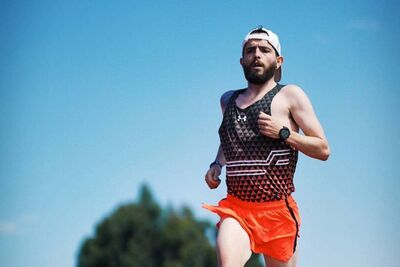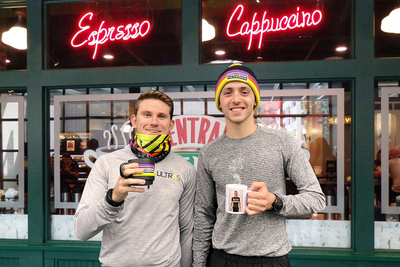Running coach Evan Scully recently tagged us on Twitter when explaining to a fellow runner why PF 90 Gels are ideal for long runs. I reached out to Evan to thank him for his kind words about the ‘jumbo gel’ and was intrigued to hear more about his story.
Evan has a condition called Cystic Fibrosis, which is diagnosed by the same gold-standard measure that we use for our Sweat Tests with athletes. People with CF typically have very salty sweat and it can be a life limiting condition.
I jumped on a video call to hear more about Evan’s inspiring story, from being told that he’d be lucky to live beyond 10 to breaking CF running world records from 5km to half-marathon distance…
Hi Evan, thanks for taking time to share your story with us. Let’s start with your CF diagnosis and how that impacted your early years…
No worries at all. I was symptomatic from birth. I wasn't drinking, I wasn't keeping anything down, and I constantly had some sort of cough which they just put down to chest infections. My parents kept saying that “this isn’t a chest infection”, but the doctors kept putting me on more antibiotics, until one doctor decided to get me tested. So, it was five months into my life that I was tested for CF.
If I’m honest, when I was growing up, I never wanted anybody to know that I had CF because I didn’t want to be different. I always tried to hide the fact that I was taking medication by pretending to cough and taking it.
My parents would give me physio five or six times a day during my childhood, which involved the traditional clapping on each side of my lungs for 30 minutes each time. But my childhood was pretty much as normal as my friends’, apart from getting up early and getting my back beaten!
I’ve taken nebulizers and digestive enzymes during the course of my life but I don’t think of that as something unusual as it’s been the norm for more than 30 years. I guess it’s a bit like most people don’t wake up thinking about their left arm - it’s been there the whole time and it’s part of you!
What was the advice you’d receive from health professionals when it comes to managing your CF symptoms and how has the condition affected your ability to take part in sport?
When I was growing up, experts thought I wouldn’t live much beyond 10 and people with CF in Ireland had a life expectancy of about 32 at that time, which is one of the lowest in the world. It’s changing for the better here but it’s telling that the physios were saying I shouldn’t exercise in my younger days, when it's running that has actually become my medication.
I've tried lots of sports and I’m hugely competitive, but running has been the constant. I remember when I was about four years old and some organisers at a holiday park were trying to make the kids tired with a run till you drop race, but I was running with 12-year-olds and just wouldn’t stop. They had to physically stop me running.

Haha! So how did you go from chasing people around a holiday park to a World Record holder for a runner with CF over distances from 5km to half-marathon?
So, my best times were 14:15 for 5k, 30:30 for 10k and 67 for a half pre-2012, so I started dreaming of qualifying for the Olympics. But then I realised I’m not going to make the Olympic Games and started to hate every race, to the point where I’d rather be at home with a cup of tea. I was putting too much pressure on myself.
Around the same time, I was doing physical therapy work with the 1983 World Championships 5km gold medalist, Eamonn Coghlan, and he must have spoken to Mo Farah’s coach Alberto Salazar, who invited me to go and work with Mo and his group in Oregon.
I probably shouldn’t have gone training with a double-Olympic champion because I soon realised that the pace of their ‘easy’ runs was equivalent to my tempo runs. It was at this point that I started working with athletes rather than competing against them…
You’ve gone on to enjoy great success as a physical therapist and coach with more than 100 Olympians, including 32 medal winners. How have your own experiences impacted your approach as a coach?
Even when I was trying to compete at 16 years old, I was looking at other people and talking to them about how they can improve. I’d always want to try to help people to become a better runner, even if it was to my own detriment.
I didn’t have many people to look up to when I was growing up with CF and I remember writing my first blog thinking that this might help someone younger. I got a few emails straight away from parents of children with CF asking what their children should do training-wise, which is a hard question to answer as their lung function might be different to mine.
There’s no ‘copy and paste’ answer unfortunately, but I’ll always have a conversation with them. I’m happy I wrote that blog as it might mean that it’s helped a child with CF get into running or sport. The big thing for me is that I’ve witnessed a change in Ireland where they’re seeing people like me who’ve been able to exercise their way out of hospital.
I’m coaching three athletes with CF and the big thing for people with CF is that our sweat is particularly salty. This came to a head for me at the 2017 Dublin Marathon.
From about 2013 up to 2017, I didn't really race but I still ran. So, I was running regularly and my neighbour had seen me out a few times and said, “jeez, are you training for a marathon?”. I thought that was a ridiculous idea but then I looked and it was exactly 10 months until the 2017 Dublin Marathon. Within a few days, I looked up what the CF world record for the marathon was and it was 2:47.
So, I figured I can't just do the marathon, I have to break the record. I got marathon fit and headed to Dublin.
Aiming big early on then. How did that first marathon go?
I was on for a 2:44, up until what felt like every single muscle in my body went into cramp at about mile 23. I’d never experienced anything like that before. Aerobically, I felt fine. I’d planned all of the important details, but the only thing I didn't factor in was the relationship between CF and salt.
Off the back of that, I Googled ‘really strong electrolytes’ and found the Precision Hydration range. Which is how I came to find out about you guys and I’ve been using the electrolytes and PF 30 and PF 90 Gels since.
People with CF tend to have particularly salty sweat and so I’ve got a better understanding of that nowadays and tend to replace more of what I lose in my day-to-day life. I can’t taste salt, so I put salt on from memory rather than taste, which means my wife isn’t always happy with my cooking! I do take more salt with my meals and I use electrolyte tablets in my day-to-day life, including electrolytes in hot water rather than a cup of tea during evenings.

Since then, you’ve run the Milan Marathon and a ‘backyard’ marathon during lockdown. What are your goals moving forwards?
Yeah, I went over to Milan to try and break the world record again but I injured my Achilles three weeks out and ended up just getting through in about 3:15.
And then I was training for a 50k but we went into lockdown five weeks before, so I figured I had some decent mileage in my legs and I might as well be one of those gobsh!$£s that does a virtual marathon during lockdown! We couldn’t go beyond a 5k radius from our home, so I did my third ever marathon in 2:55 around a loop near my house - which is unofficially the fastest European time for someone with CF.
Looking ahead, I’m going for the Paris Marathon and I don’t know how I’ll celebrate under the Arc de Triomphe if I run 2:40 or under, although I’d be very happy with a 2:45.
And then beyond that, I’d like to get back under 16 minutes for 5k, although I’m definitely not going to run another PB because I’m never going to train like I did to set the world record in my younger days!